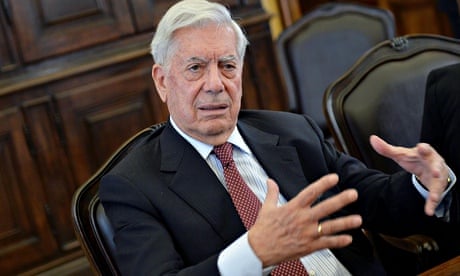Russian authorities are "using words to destroy meaning", according to a high-profile group of writers, including two Nobel literature laureates, who have come together to condemn what they called the "waves of propaganda" emanating from the country, in the wake of the "incessant acts of aggression towards Ukraine from the side of the Russian Federation".
Writers including Mario Vargas Llosa and Tomas Tranströmer, who won the Nobel in 2010 and 2011 respectively, have denounced what they called a "tsunami" of anti-free-expression laws emerging in Russia, citing in particular "treating international NGOs as foreign agents; anti-gay laws; a law permitting the blocking of websites without a court order; laws against discussing Russian history; [and the] religious defamation law", which criminalises religious insult.
"In the name of security, human rights are being dangerously undermined," said the writers, as conflict over Russia's annexing of the Crimea in March continues to escalate. "There has been the illegal annexation of Crimea, which makes us deeply worried about the rights of the Tatar population, and following it armed groups have created violent disorder in the eastern parts of Ukraine with the goal of destabilising the country. Ukrainian PEN has talked about journalists and citizens being shot, murdered, kidnapped and tortured."
The Russian branch of the writers' organisation PEN said that the violence was dependent upon the co-opting of language, because "words are the only means we have to construct meaning and express reality", and "the Russian authorities are currently using words to destroy meaning". "It goes without saying that this is a crime against culture," said Russian PEN.
A conference held last week by PEN International in Stockholm saw the Russian author Lyudmila Ulitskaya speak of "the lies poisoning minds which have no other sources of information", and Ukrainian academic Aleksandra Hnatiuk of "propaganda designed to create enemies", said the writers' organisation.
The meeting was one of many organised by PEN International to bring writers from Russia and Ukraine together with their fellow authors from neighbouring countries to "talk about peaceful solutions to the current conflict", and keep "channels of public discussion open", said PEN. The Canadian author John Ralston Saul, president of PEN International, said that "peace and stability is not about deals done behind closed doors, but the ability of people to talk to each other in public".
With talks in Kiev collapsing yesterday, and Russia cutting off the gas supply to Ukraine, Saul, along with Llosa, Tranströmer and other writers, have now put their names to a statement which avers that "the only real security lies in opening channels of free expression".
"Those on the front lines of this situation are often the journalists, in whatever country," say the writers. "We admire their courage and appeal to those under pressure to remember, in Lev Rubinstein's words, that 'propaganda is the collapse of language'."

Comments (…)
Sign in or create your Guardian account to join the discussion